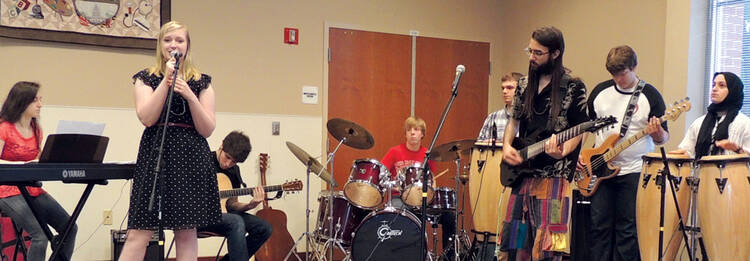I’m a teenage drummer interested in interfaith work. When I recently combined these interests, I found myself on a journey of discovery that taught me about the nature of interfaith dialogue and my own Catholic faith.
Last year I helped start an interfaith rock band with the assistance of my parish, St. Katharine Drexel Catholic Church, and a grant from the Community Foundation of Frederick County, Md. We called it Interfaith Rock. Made up of Buddhist, Catholic, Jewish, Muslim and Protestant high school and college musicians, the band performs exclusively at charity fundraisers and other nonprofit events. We feature a playlist of rock songs with peace and justice themes and rock versions of religious songs from different faith traditions.
Our mission is to promote interfaith understanding and respect through music and community service, highlighting the harmony of shared values and the richness of diversity. Instead of merely talking about our faith perspectives, we join together in action. The journey has been a surprising one, and none of us could have guessed where this project would lead us.
Just by playing music, we found that interfaith exchange arose naturally. For example, one song we played, called “I Love You and Buddha Too” was about embracing all religions, and it included the name of the holy prophet Muhammad. Jacob, a Buddhist, asked our three Muslim bandmates, Sadiq, Salmaan and Marya, if they were comfortable with the reference, indicating that he thought the holy prophet’s name was not supposed to be uttered in song, or at least not without being followed by the blessing, “Peace Be Upon Him.” All three appreciated our sensitivity, but wanted to keep the reference in. Given the powerful message of interfaith unity and respect conveyed in the song, they felt that Islam should be represented. Also, they did not want us to feel uncomfortable talking about the founder of their religion. Without even trying, interfaith dialogue was occurring, one song at a time.
The community service part of our mission helped us to bond on an even deeper level. It became clear to each of us that service was a major value in all of our faiths. I especially remember one concert and the feeling of joy we shared as we looked out at the faces of people who would be fed and sheltered with the money that our music was raising. That night, we realized that our common goal was larger than any of our other individual beliefs.
I have heard some adults express concern that interfaith youth activity can confuse or dilute a young person’s faith. But I have found the opposite: Interfaith Rock has deepened my Catholic faith. It’s like playing the drums. I could spend my whole life banging away in my basement alone, but, instead, I learn by playing alongside other musicians. With my band, I’ve found that necessary and delicate balance between following other instruments and creating my own beat and, to my surprise, a balance in my spirituality between embracing unity with other faiths and deepening my own separate identity.
When the band couldn’t find a good Buddhist song, our guitarist and faithful Buddhist, Jacob Abuhamada, wrote his own. He wore his Tibetan shawl for the performance, chanting the piece in a guttural growl. The audience looked at him in shock, but Jacob took no notice. I couldn’t help but smile, thinking to myself how Jacob’s religious beliefs were miles away from mine, and yet how much he inspired me. From that day on, I found myself getting more involved in my parish community and my school’s campus ministry. I now pray more, attend Mass by choice and worry less what others might think.
Another unexpected experience happened at a charity concert where we shared the stage with an evangelical Christian Rock band of homeless men from the Frederick Rescue Mission, a local shelter. Before the performance, our band was practicing the song “One Day” by Matisyahu, our finale and my personal favorite, when we noticed a man from the rescue mission offstage crying. A faint smile beneath his tears, he explained that “One Day” was his favorite song, too, an inspirational piece that had given him faith and gotten him through difficult times on the streets.
I suddenly realized that I felt a close emotional connection with this stranger, and that I truly saw the face of God in him. I found myself marveling that a person who had experienced untold tragedy in his life could still have utmost faith in God. He came from a different faith and a wholly different world, yet I still felt connected to him. It was not until that moment that I really understood and experienced on an emotional level the Catholic emphasis on Jesus being present in the poor and the stranger. There I was, standing with my Buddhist, Jewish and Muslim friends, talking to an evangelical Protestant and having the most powerful experience ever of my Catholic faith.
Throughout my life, I have absorbed a whole bunch of words about faith. I have heard all about Catholicism in the classroom and in the pews. I have heard all about other religions through conversation. But clearly, faith is not in these words alone. Faith is all around me. It is in my bandmates from different religions, it is in the experiences we encountered, and it is in the stranger from The Rescue Mission. Now I know that, regardless of the religion, faith is more like the music we play—uniting us, surrounding us and staying with us long after the last note is played.








